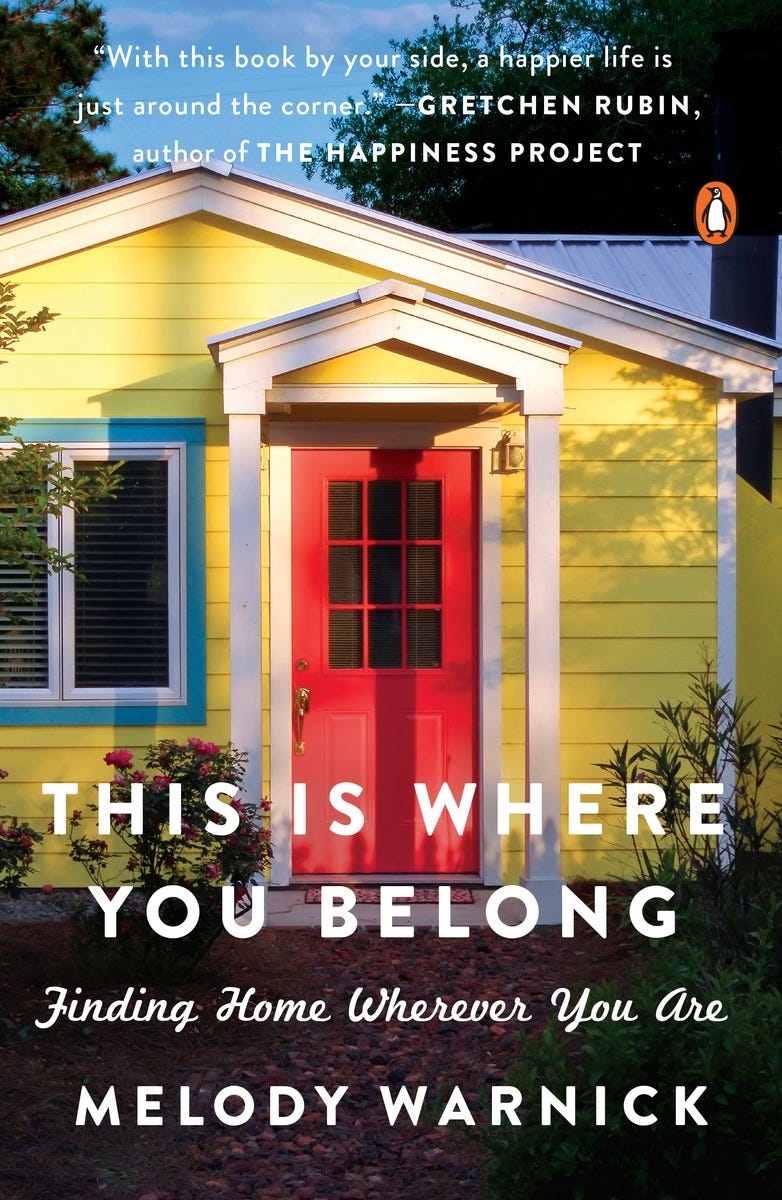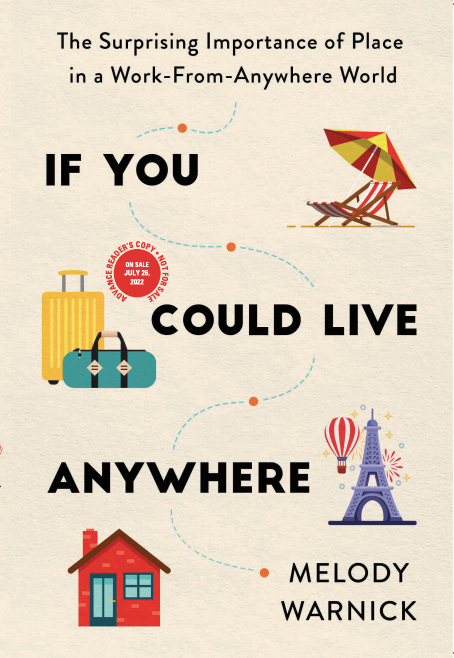Ask a Smart Person: An Interview with Melody Warnick
Talking about loving where you live, making friends as adults, and the motivational power of misery with the person who literally wrote the book on the subject (two of them, actually!)
I originally met Melody Warnick through her husband Quinn, then a writing faculty colleague. He'd mentioned that his wife was a freelance writer, so I invited her to speak to my Magazine Writing class1. I still teach (and use) her advice on pitching articles to publications2. Then, she relocated, wrote a book on learning to love where you live, and accidentally became an expert on the topic. My own recent move inspired me to reread This is Where You Belong 3and that inspired me to ask Melody for an interview.
BETH: A lot of us in Austin were bummed when you moved to Virginia for Quinn's job, but it was your own struggle to connect with your new community that led you to write the book This Is Where You Belong. The book delves into how we create a sense of belonging in a place. I originally reviewed it for a magazine, I still give it as my standard housewarming gift, and I have pulled it out again recently when my husband Mike and I moved to an exurb of Austin. Can you give readers some backstory on what led you to write the book?

MELODY: Misery was a good little motivator—ha! By the time I landed in Austin, Quinn and I had lived in four other states, and we only stayed in Texas for two years before heading off to a little college town called Blacksburg, Virginia. Which I wanted so badly to love, and which I kind of hated at first. Too small. Too rainy. Too many hills. Weird Southern accents, etc. I wanted to figure out how to feel happier in my new town, and that led me down the path of learning about place attachment and figuring out how to apply it to my life. Spoiler alert: It worked. We’ve been in Blacksburg now for almost ten years and I have zero desire to live anywhere else right now.
BETH: The Next Thing is about reinvention, which is something that a lot of us have had to do due to the pandemic. It has changed people's social connections. This Is Where You Belong specifically addresses reinventing one's social circle and place in the community. What have you learned about rebuilding friend groups that you could share as we look toward the post-pandemic world?
MELODY: Developing adult friendships can be so awkward, and yet all the research 4points to how vital it is. You can love a lot of things about where you live, but if you don’t feel socially connected, chances are good you won’t ever feel really at home. And that’s true even for raging introverts like me. So you have to be proactive and strategic about it.
For my new book, If You Could Live Anywhere, 5I interviewed the lovely Austinite (and fabulous editor) Tiffany Yates Martin about her strategies for making friends when she moved to Austin by herself, and they ran the gamut: She joined the neighborhood moms group even though she didn’t have kids. She joined a writing group she saw advertised in the newspaper. She invited people that interested her out to coffee. Really, she did not leave any friendship stones unturned. I think coming out of the pandemic (is that a thing?), a lot of us will be reassessing how social we want to be. But being hermetically sealed in your home office forever is not a good plan for happiness.6
BETH: While my new neighborhood is not that far from where we lived in Austin, what I shall call its "vibe" is very different. *I* am very different from my new neighbors: my politics, education, interests, etc. You've written about the problem of having very different views from your neighbors. What advice do you have for someone who finds herself feeling like the only blueberry in the muffin? Asking for a friend, obviously.
MELODY: Oof, I feel this. I think we all do. Theoretically, this is where you learn that people with really different political beliefs are still human and worthy of civility and friendship. But if you have a lot of residual pandemic-related anger about the people with different political beliefs (not that I do… nervous laughter), you can feel like, “Why bother?”
My recommendation is to 100% avoid talking politics and do as many nice things for them as you can. Bring them cookies. Roll their trash cans up their driveway.7 It’ll foster some goodwill. You guys may never be BFFs, but you can prove to yourself that we don’t all have to live in politically segregated communities. We can get along with people who aren’t like us.
BETH: You've written about the connection between your sense of place and your family. One of my favorite chapters in your book was the one about your young daughter inspiring you to start a chalk-art festival like the one you'd enjoyed in Austin. Now that we both have kids in college, are people going to think we're weird if we hang out at chalk art festivals trying to make friends? How do we stay connected to our communities without the kids acting as social conduits?
MELODY: This is a great question, Beth. If we ever move again it’ll be without kids, and I’ll admit I’m slightly nervous about what that would be like, since kids are just so good at greasing the social skids. On the other hand, there’s tons of community/social stuff you *can’t* do well with kids, from trivia nights to bar crawls to concerts. This is your chance to be really forward and ask other people on adults-only friend dates. Or join the classes you didn’t have time for when you had kids at home. Or, I don’t know, invite a neighbor child along for cover. P.S.—You can still go to chalk walks and fairs without kids. Think of all the people who go to Disney World without kids! It’s cool. P.P.S.—Dogs are as good as or better than kids as ice breakers. Just saying. 8
BETH: In our highly mobile society, your book really met a moment and kind of turned you into a guru—you even gave a TEDx talk! Did you imagine anything like that happening when you wrote it? How have you handled the reinvention that came with that experience?
MELODY: Uh, no. It honestly totally surprised me. I’d been a freelance writer for a long time, so writing the book was pretty much my end goal. I did not imagine getting speaking invitations or doing things like TEDx, so it’s been a whole long process of dealing with my anxiety around it, learning a whole new craft, learning to like doing it for the most part. I have a little note on my office bulletin board that I wrote myself after doing a speaking gig in Vermillion, South Dakota: “You actually *like* doing this!”9 Because I forget sometimes.

Speaking of reinvention, I made a huge leap a few months ago when I took a full-time job as a writer at Virginia Tech. I’ve been a freelancer, mostly part-time, for 20 years, so there’s been some emotional and logistical whiplash, and I’m still finding my new normal. But there were things about being freelance that I wasn’t loving anymore (like, um, the pitching magazines that I talked to your class about, Beth), and I wanted to try something new. I’ve been surprised by how much I like it. But now I have to figure out how to do speaking events and launch a new book with a full-time job, so… yeah. Reinvention.
BETH: What have you learned from all of your research and writing on loving where you live that might be relevant for people who're going through life renovations?
MELODY: The whole idea behind This Is Where You Belong was that I was going to force myself to fall in love with my town by changing the way I acted in it. I designed Love Where You Live experiments based on what the research showed made people feel attached to their community, and then I spent a year or so doing little micro-action steps like walking or shopping at the farmers market or taking banana muffins to my neighbors. My theory was that positive action would drive positive emotion, and it did. Changing my behavior actually made me feel better about where I lived.
Here’s the takeaway, even if you’re not moving: That you can take charge of your own happiness. That you can experiment with little behavioral tweaks until you find new patterns that work for you. That you need to give yourself time and grace to shed the old and feel comfortable in your new life. That many small changes can add up to a reinvention just as surely as one massive one.
BETH: So, tell me about your new book!10
MELODY: It’s called If You Could Live Anywhere: The Surprising Power of Place in a Work-from-Anywhere World and it’s about how we can make choices about our place in ways that help us find career and financial success, connection, purpose, and happiness11. It comes out in July and pre-orders are the bomb!
You can preorder If You Could Live Anywhere: The Surprising Power of Place in a Work-from-Anywhere World here; order This is Where You Belong here, and subscribe to Melody’s newsletter at melodywarnick.com.
He just mentioned it off the cuff, like no big deal. Then I googled her. Sister’s got pieces in Oprah’s magazine, Slate, The New York Times, you know, little mom-n-pop operations.
Despite being a self-described raging introvert, she was a total rock star--I'm pretty sure her visit gave my course evals a nice boost.
Note: I’m not trying to sell anything and don’t make money from links. I might in the future, but for now all links and recommendations are purely uncorrupted FYI.
This article from the Mayo clinic’s website gives tips for making friends like, “be kind,” “listen,” and other behaviors one might think would be obvious, but apparently are not (see my previous article “The Booster, The Break-up, and a Death in the Family.”)
I had no idea Melody had written a second book before I asked for this interview. I really just wanted advice on how to feel more at home in my new neighborhood.
[Pauses digging moat around house] IDK what you’re talking about.
And, here, in one casual comment, Melody has reduced my anxiety level about this topic by half. This is the best kind of advice, isn’t it? The kind that seems obvious when you hear it but you never could’ve come up with it on your own? Now, where is that loaf pan?
See footnote above. This is really Melody’s superpower: understated wisdom. I was originally going to bold the little pearls of wisdom in her comments, but it was starting to look shouty.
Not even kidding: I am going to write this note to myself immediately. Why is this so easy to forget?
Q/A sequence edited to make sense.
SOLD! Who wants to start a book club?




Such great advice on how to "bloom where you are planted." With a move on my horizon, this one really resonates!
Great topic to cover for the present moment. Enjoyed.